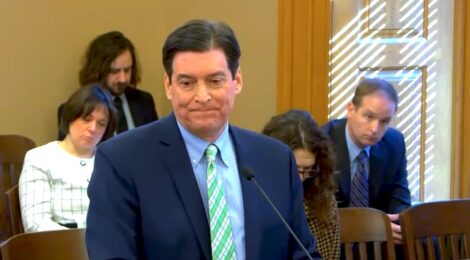KU wins $22 million to build national security research center; FBI director on campus for cybersecurity conference

photo by: Chad Lawhorn/Journal-World
FBI Director Christopher Wray delivered the keynote address at the FBI & KU Cybersecurity Conference on April 4, 2024, at the Kansas Union Ballroom.
On a day when the nation’s top cybersecurity crime fighter was on the University of Kansas campus, leaders announced that KU has received $22 million in federal funding to build a new national security research center in Lawrence.
U.S. Sen. Jerry Moran, R-Kan., announced that a yearslong effort to secure federal funding for the center has been successful. Moran made the announcement while introducing FBI Director Christopher Wray, who was giving the keynote address at a national cybersecurity conference hosted by KU on Thursday.
KU leaders said the funding is a “foundational” step forward in making KU a national leader in keeping and attracting researchers and companies that want to work in the growing realm of national security, which can include everything from cybersecurity to radar technology to artificial intelligence.
“I think this puts a huge stake in the ground for us,” KU Chancellor Douglas Girod said in a brief interview with the Journal-World.

photo by: Chad Lawhorn/Journal-World
U.S. Sen. Jerry Moran, left, and KU Chancellor Douglas Girod, are pictured on June 23, 2023, at a 15-year anniversary event for KU Innovation Park.
The center will be built on KU’s West Campus, which is north and west of 23rd and Iowa streets, as part of the KU Innovation Park development. Innovation Park currently has three buildings that house largely startup technology companies, and this new 80,000-square-foot center will be constructed near those buildings, Adam Courtney, chief executive officer of Innovation Park, said.
The building is expected to add about 250 jobs at the park initially, but the development is projected to spur interest from companies that want to be close to national security researchers and students.
“As far as what role we can play nationally, I think our reputation is growing by leaps and bounds,” said Perry Alexander, a professor of electrical and computer science who is one of KU’s top cybersecurity researchers and the founder of a technology startup located at Innovation Park.
Making national security research an emphasis has been a key strategy of the university. As the Journal-World has reported, KU became one of the few universities in the country to create a program where students could earn a minor or a certificate in Intelligence & National Security Studies.
Thursday’s event also was a milestone in the university’s efforts to establish itself as a national leader in the field. KU created the cybersecurity conference in partnership with the FBI. This is just the second year for the conference. Wray’s keynote address drew a capacity crowd of several hundred people to the Kansas Union Ballroom, and cybersecurity experts from across the country were scheduled to be on the KU campus throughout Thursday to participate in seminars and panels.
Wray told the crowd that the FBI is spending an enormous amount of time and resources battling cybercriminals, who often are state-sponsored criminals. Battles with Chinese-based cybercriminals are constant, he said.
“We are confronting them all across the country and around the world, literally every day,” Wray said.
Wray, who began a 10-year appointment as FBI director in 2017, said the agency focuses on going after not only the cybercriminals themselves, but also their technology infrastructure such as servers, and their money, including new ways to freeze cryptocurrency accounts, which he said “I can’t fully describe here.”
“We use a wealth of hard-earned experience to design operations to hit them everywhere it hurts and to put them down hard,” Wray said.

photo by: Chad Lawhorn/Journal-World
FBI Director Christopher Wray speaks at the FBI & KU Cybersecurity Conference on April 4, 2024 at the University of Kansas campus.
On other topics, Wray told the KU crowd:
• Ransomware criminals — who traditionally lock companies out of their computer networks unless companies pay a ransom to gain access — are becoming more sophisticated and greedy. In addition to locking companies out of their computer networks, many are now stealing company data as well, and demanding one ransom to unlock a company’s computers and another ransom to ensure the company’s data is not sold on the dark web. Wray urged companies who have been hacked to contact the FBI quickly. He said the FBI has had success in recovering ransom payments, but he said time was of the essence in such cases.
• Artificial intelligence is a topic that is on Wray’s mind in terms of how the FBI can use it to fight crime, but he said he actually spends more time thinking about how criminals will use it to commit crimes. He said thus far he’s seen AI turn “mediocre bad guys” into more competent criminals. Foreign criminals, he said, are using AI to write text for email scams that sounds more American, for instance. However, he said he hasn’t seen many “really elite bad guys” who currently find AI technology competent enough yet to take their crimes to a new level. That gives the FBI a window to try to get ahead of the technology, but he said the issue will be a large one for years to come.
“If everybody in this room thought of some kind of adversary, criminal nation state or otherwise, and thought ‘boy, I sure hope those guys aren’t using AI,'” Wray said, “I’ve got bad news for you. They are.”
As for the federal funding announcement, the news comes after years of lobbying on the part of KU. Moran is a member of the Senate Appropriations Committee and also a member of the Senate Intelligence Committee. He’s been a champion on Capitol Hill for the idea that the country needs a national intelligence center in the heartland, and said KU had done good work to show that its research and potential made Lawrence the right place for the project.
Courtney, the Innovation Park CEO, said the project — dubbed the Kansas National Security Innovation Center — now is in the design phase and that the organization will push for an aggressive timeline to open the center in early 2026.
The project comes at a time when the KU Endowment Association also has begun work to develop retail, residential and office uses on KU’s West Campus in an effort to make KU Innovation Park a more attractive place for private companies to locate their research and development departments or other such operations that could benefit from being close to KU academics.
“We’ve seen a lot of interest from the private sector, and we also think it will be a great way to capture some of the young professionals coming out of the university who want to live work and play in an area like we are building out there with KU Endowment in terms of residential, retail, restaurants, day care,” Courtney said. “All those things are important to companies too as they are trying to attract workers.”
University leaders are projecting the park to have a big economic impact on the local economy. By 2026, park employment is expected to top 900 employees with payroll of more than $60 million. By 2036, park leaders are projecting more than 4,000 jobs and payroll topping $260 million.

photo by: KU Innovation Park
A rendering shows the projected development in 15 years at KU’s Innovation Park on West Campus.




